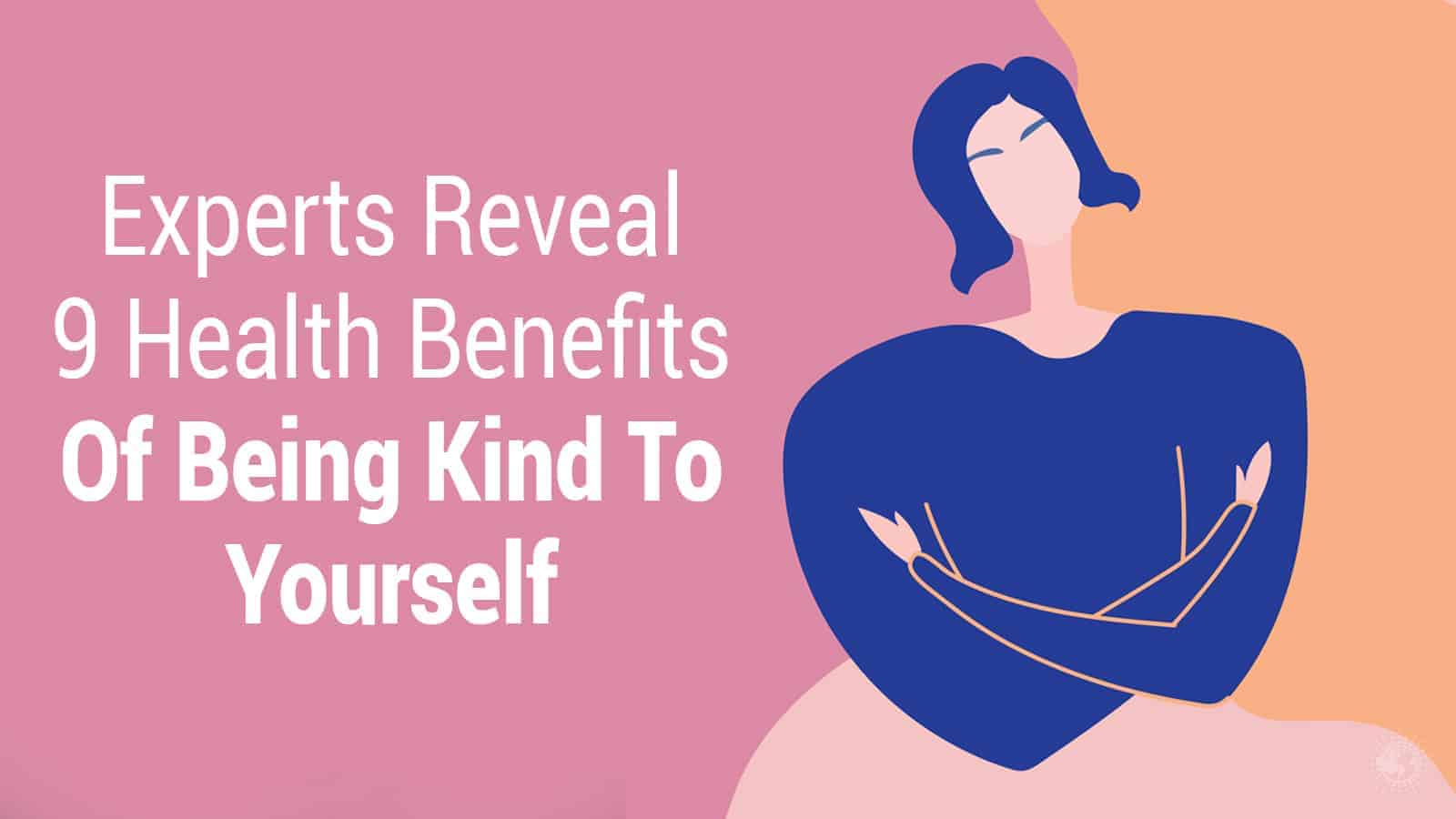You may know of the importance of caring for yourself physically. You are likely aware of the need to eat well, exercise often, and live a healthy lifestyle. But did you know that these habits are not the only way you should care for yourself?
A commonly overlooked aspect of looking after yourself is about your mental health. Sure, you might be careful about things that can trigger depression, but how compassionate are you to yourself? Did you know that acts of kindness directed internally can be even more beneficial for your overall health? Here’s how experts reveal nine powerful health benefits of being kind to yourself.
1. Stronger Immune System
When you’re under stress, the body experiences the fight vs. flight instinct, causing the body to focus all its efforts on survival instead of ensuring individual organ and function strength and power. Everything gets slowed down, and you can suffer as a result.
According to research spanning three decades, immunity is considerably impacted by stress, meaning a lack of positive thinking can lead to a higher risk of contracting all sorts of diseases.
According to the University of Texas professor and author Kristin Neff, Ph.D., this means that self-compassion can successfully increase or improve the function of your immune system. There’s a chance you’ll experience:
- Fewer colds and illnesses
- Fewer symptoms of illnesses
- Lower stress reactivity
- A better balance of hormones and microorganisms
- Healthier appearance and body
In fact, self-compassion “meditation” is a real way to help promote healing. Simple meditation allows for mindfulness practices that can teach you to be kind to yourself and exert more control over your thoughts and emotions.
2. Stress Reduction
When you’re too hard on yourself, you’re constantly criticizing yourself and, potentially, everything around you. This kind of criticism leads to stress and – as you’ve probably guessed – a fight or flight response, says Stanford University Center for Compassion and Altruism Research and Education science director and author Emma Seppala, Ph.D.
When you critique yourself, you cause your body to release the stress hormone, cortisol. Cortisol is fine in small amounts and when needed, but when released chronically, it can lead to health issues such as:
- Acne
- Easy bruising
- Weight gain
- Thinned skin
- Reduced rate of healing
- Irritability
- Concentration loss
- Headaches
- Weak muscles
- High blood pressure
- Fatigue
According to studies, it’s possible to use positive techniques of self-compassion to break the cycle of negativity, stress, and cortisol production. This is because thinking good thoughts can lead to surges of the feel-good hormone dopamine, says Adelphi University psychology professor and award-winning author Deborah Serani, PsyD.
3. Changing How You Think
When you’re kind to yourself, you begin a new cycle and process of thinking. With long-term practice, you can completely change the way your brain usually functions, allowing for a more efficient structure and a more positive overall thought pattern, says Neff.
This is because being kind to yourself can thicken the cortical, which is the brain portion responsible for communication across the brain. Actions such as meditation can further rewire the brain to be more beneficial to you and your everyday life.
On top of that, self-compassion is crucial to social connection. Essentially, Seppala states that being kind to yourself is a great way to connect with others, and her research shows us that this can help you find common humanity. Instead of losing itself in wrongs and flaws, the brain learns to observe, relate, and empathize.
4. Healthier Heart
You’re probably already very familiar with how stress affects fight vs. flight responses, given the fact that we’ve talked about this multiple times! Naturally, that extends to more than just the cortisol production that we’ve mentioned again and again. After all, that kind of stress response isn’t limited to only one function.
When your body is in this fight or flight mode, you:
- Experience spikes in blood pressure
- Have an accelerated heart rate and pulse
- Cardiovascular strain
Just like with cortisol, this isn’t a bad thing when it only happens when your heart needs the boost – like in a real emergency situation where the rush to your heart helps you survive. On a chronic basis, though, it indicates that your body is attempting to solve its problems by attacking itself, says Neff.
Learn to relax and be kind to yourself instead of allowing stress to take over your body. Your heart will, in the long run, thank you.
5. Exercise Motivation
People often falsely believe that they need to exercise to feel good about their bodies, their appearance, and their overall selves. Ironically, for most people, it works the opposite way. The act of pushing yourself to work out and succeeding in completing that task can give you a massive boost to your self-esteem.
So instead of hating your body and demanding exercise to ease those negative feelings, love your body instead. Sure, it is easier said than done. However you can take baby steps by being kind to yourself. When you care about your body and your mind, you’ll be much more motivated to do things that are good for them, says Neff. Here are some tips to make this happen:
· Do Mirror Exercises
Every day, look in the mirror and repeat positive affirmations to yourself. Positive self-talk has been proven to work wonders for you and your self-perception. Instead of pointing out your worst features, tell your reflection, “I love you.” Appreciate the parts of you that you do love!
· Understand What A Real Body Is
Social media is full of people using angles, editing apps, and careful photo selection only ever to show their best side. The media is full of celebrities with expensive personal trainers and professional chefs at their disposal. Your body is real, and it’s realistic. It is beautiful and doesn’t need to measure up to these unreal, unachievable standards. Remember that!
· Be Grateful
Thank your body for the wonders it does. Appreciate it for keeping you healthy. Acknowledge it for your talents. Thank it for its strength. Thank it for being beautiful, Expressing gratitude towards your body is a huge step forward in being kinder to yourself and reaping the exercise benefits that follow.
6. Reduced Vice Dependency
A lot of times, a lack of self-love can cause someone to depend on external factors to help them feel happy or better. This type of co-dependency is quite unhealthy and can be very toxic, especially if you find yourself relying on other human beings to feel satisfied. Vices can include:
- Smoking or vaping
- Taking drugs
- Drinking alcohol
- Eating in excess
- Self-harming tendencies
- Obsession and hyper fixation with fantasy
- Co-dependency with loved ones
When you’re kind to yourself, you learn to be self-dependent. You learn that you’re a great person to rely on. As such, you’re less likely to turn to unhealthy vices. Studies indicate that even severe addictions can be helped through kindness.
7. Mental Resilience
One of the very, very best benefits of self-compassion is that you become mentally stronger. It’s much harder for the world to bring you down when you are your support system.
Does this mean you’d never seek out help from external parties? Of course not! Everyone needs help sometimes. But, according to Seppala, when you practice self-compassion, you:
- Don’t burden yourself with excessive criticism.
- Can keep a more definite peace of mind
- Manage to retain emotional energy
- Are more mindful of how you speak to or think of yourself
These factors combined contribute to your mental fortitude when you’re more self-compassionate, so it’s a fundamental trait to try to maintain!
8. Pain Management
Chronic pain and other similar conditions and issues can be debilitating. Worse still, they’re known for having less than stellar effects on positive thinking. In fact, considerable, untreated, or difficult-to-manage pain levels can contribute to and be affected in turn by symptoms of anxiety and depression.
According to Serani, acts such as meditation and mindfulness, which work to improve your self-compassion, prove to help relax the body enough to reduce chronic pain of all kinds. In fact, because self-compassion is so deeply interwoven with chronic pain – as found by plenty of studies – it’s not an exaggeration to say that they do go hand-in-hand.
When your self-compassion is low, your pain is worse, and when your pain is worse, your self-compassion gets even smaller. You need to break the cycle! Aside from focusing on being kind to yourself, you can also manage chronic pain and your kindness by:
· Therapy
Acceptance and Commitment Therapy and Cognitive Behavior Therapy are both typical go-tos for those dealing with chronic pain, according to Ted Jones, Ph.D., CPE. This kind of thinking shifts your thoughts from self-loathing or self-pitying to considering future options, which puts the power back in your hands.
· Pacing Yourself
When you’re not kind to yourself, feelings of guilt may cause you to push yourself extra hard. You may work yourself down to the bone, even when your body needs a break. Jones encourages the act of learning your body and pain’s limits and respecting them with the knowledge that you deserve to rest, too.
· Chill Out
Holding tension in your body due to stress is often a clear sign that you’re not kind to yourself. Worse still, holding that tension causes stiffness that can further worsen chronic pain.
9. Diabetes Management
Diabetes is a severe condition, and it’s not something any proper mindset can cure, of course. This fact is not to say, though, that positive thinking can’t aid in overall management. In fact, according to Neff, a lot of the additional problems of diabetes can come from stress and distress. Learning to manage those emotions can lead to more stable glucose levels.
Considering the concept of cortisol and how cortisol presence boosts blood sugar, this isn’t a surprise at all. As such, though it sounds a little outlandish to say, being kind to yourself can indirectly help with the management of diabetes!
Final Thoughts On Some Powerful Health Benefits Of Being Kind To Yourself
Self-compassion is a crucial skill, not just for your mental state, but for your physical one as well. The overall effects of kindness on your whole being go to show just how crucial it is to care about yourself on a deeper level. Never be ashamed of loving the person you are!
















 Community
Community

